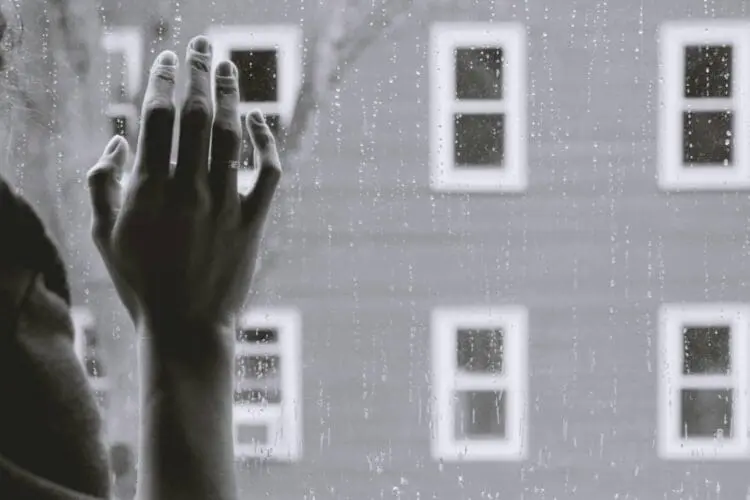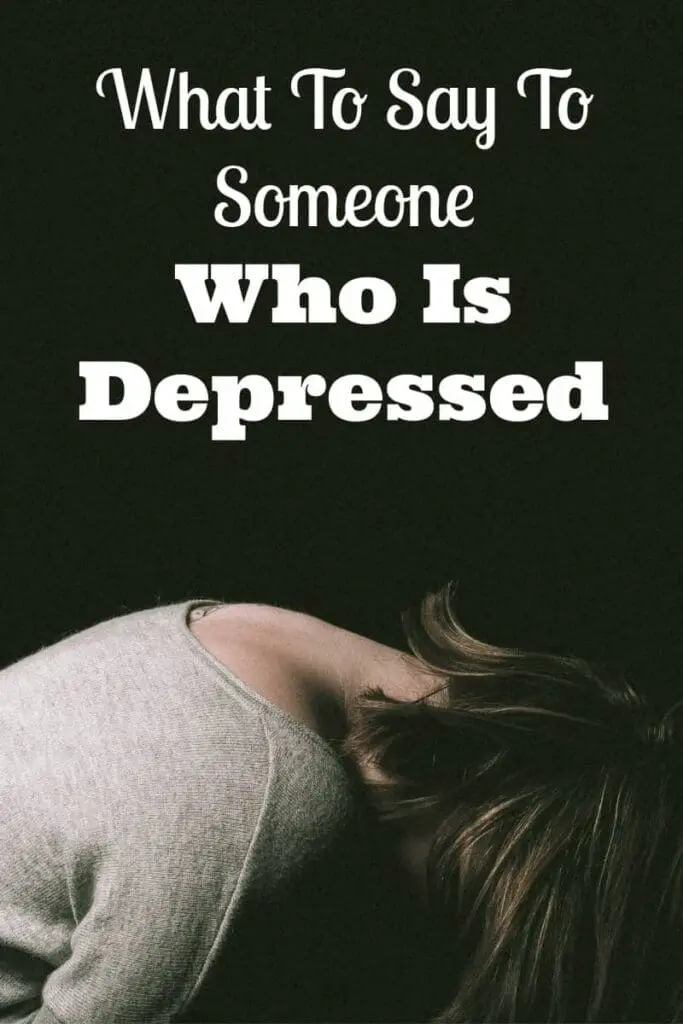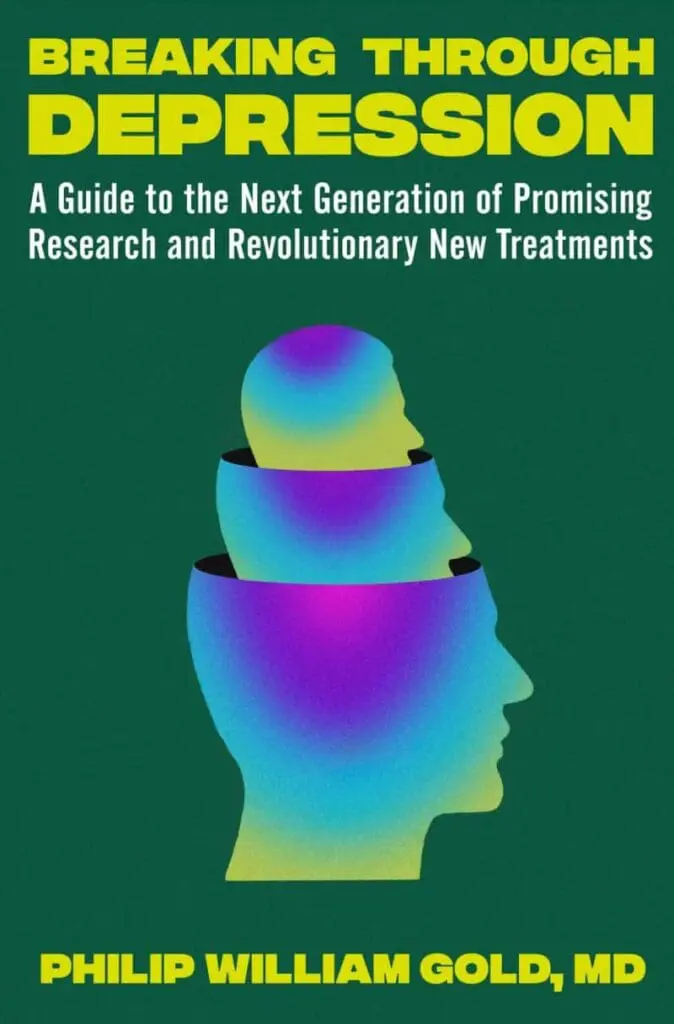Mental health issues and mental illness are often vague topics that many find mysterious. There is a lot to know and understand about the way the brain works. However, if you or your loved one suffer from a mental illness such as depression, it suddenly becomes very real and very urgent to know as much as you can. You may also find yourself wondering what to say to someone who is depressed. That is why I am happy to have Dr. Philip Gold share some insights with us today on how to help someone with depression. Considered of the world’s leading researchers of depressive illness, Dr. Gold details his groundbreaking findings and research from his decades in the field in his newest book, Breaking Through Depression: A Guide to the Next Generation of Promising Research and Revolutionary New Treatments (August 2023).
Depression is considered a mental illness. It is a common and serious medical condition that negatively affects how a person feels, thinks, and handles daily activities. Symptoms of depression can vary but often include persistent feelings of sadness, hopelessness, and a lack of interest in activities. It can be hard to know hat to say to someone who is depressed but there on tips on that later in this article. It’s important to note that depression is a treatable condition. If you or someone you know is experiencing symptoms of depression, seeking help from a mental health professional is crucial. Treatment options may include therapy, medication, or a combination of both.
Today’s information is meant to help loved ones understand and deal with depression in others. It is not a substitute for professional help. If you or someone you know is in crisis or having suicidal thoughts, it’s important to seek help from a mental health professional, a helpline in your area, or call 988 for the national Suicide & Crisis Lifeline.

Does Depression Run In Families?
___
by Dr. Philip Gold
For as long as we have had a sense of what depression is, we could see that it runs in families. Even so, studies have established that there is no single gene for depression and that genetics give you a likelihood, not a prediction, that depression will develop in your lifetime.
In the general population worldwide, the overall incidence of major depression is estimated to be 15 to 20 percent, though the incidence varies somewhat by culture. Some people develop depression largely on the basis of genetic inheritance and some largely on the basis of psychological or physical stress. That said, individuals with a sibling or a parent with depression have a two to three times greater chance of having depression, or a rate of 40 to 60 percent. If one parent has a recurrent form of depression with multiple episodes over time, the risk is about four times greater than for the average person, or 60 to 75 percent. In identical twins who share 100 percent of their genes, if one twin has depressive illness, the other has only a 60 percent chance of having the dis- order. This suggests that environment contributes 40 percent of the risk.
Understanding The Types of Depression
Excerpted with permission from BREAKING THROUGH DEPRESSION: A Guide to the Next Generation of Promising Research and Revolutionary New Treatments ©2023 Philip William Gold and reprinted by permission from Twelve Books/Hachette Book Group.
When thinking about the people in our lives with depression, especially those in our family, it is important to first understand the type of depression from which they are suffering. There are two types of depression presentations that each comprise about 30% of patients with major depression.
The first type, melancholic depression, contradicts the term depression in that it is often a state of hyperarousal and anxiety, especially directed at the self. The cardinal manifestation of melancholic depression is feelings of worthlessness and hopelessness about the future prospects for such a defective self. Melancholic patients lose the capacity to anticipate or experience pleasure, and feel vulnerable to harm rather than expecting reward. Many are bombarding by negatively charged emotional memories of failure and preventable losses. They are often perfectionistic, so that any flaw is seen as a terrible defect. They have insomnia, most often early morning awakening, lose their appetite, and generally feel worse in the morning than in the evening. Patients with melancholic depression cannot think clearly or concentrate nearly as well as they could when they feel well. While they remember past depressions, if they have had them, they often can’t retrieve what it feels like to feel well.
A second type of depression is atypical depression. In many ways, it seems the antithesis of melancholic depression. Unlike patients with melancholic depression who feel bombarded by past emotional memories and bleak recollections of their prior lives, patients with atypical depression feel terribly remote from themselves, their pasts, their loved ones, and their friends, and often feel intense loneliness. They often feel walled off from the world and may feel empty. They sleep too much, have increased appetites, and feel worse in the evening than in the morning. Like melancholics, they lose the capacity to anticipate or experience pleasure and their capacity to think clearly and concentrate is reduced.
Depression can cause many elderly individuals to seem to be developing dementia and is often called pseudodementia by clinicians. Depression should always be ruled out in an elderly person who seems to be developing dementia.
Many depressed patients do not feel the full range of one of symptom complexes subtypes of depression or a mixture of them. I would suspect anyone who feels terrible about themselves and lost the capacity to anticipate or experience pleasure to be depressed.

How To Help Someone With Depression
Here are some ways to help the individuals in your life who are experiencing depression:
- First ask about and try to understand what the individual is suffering so that depressed patients are not left alone with suffering. For those who feel terrible about themselves and have lost self-esteem, I would emphasize that it is the depression that is fueling that rather than a realistic assessment. Form an alliance with a depressed person by understanding them and letting them know that you are willing to be helpful in any way that you can.
- Since the brain is quite changed in depressed patients, and there are strong biological and genetic components to depression. Avoid judging a depressed person who is unable to cope effectively with life and pick themselves up by their bootstraps. This would only terribly damage their self-esteem even more.
- Urge the depressed individual to seek treatment sooner than later. Waiting for the depression to resolve spontaneously is not a good strategy. Moreover, as the time in depression lengthens, it tends to worsen.
- Ask if they are suicidal. This doesn’t raise the risk of suicide, but rather reduces it.
- Encourage exercise. If they are able to exercise, that often helps depression, but it shouldn’t take the place of therapy. Melancholics often don’t sleep well and this intensifies their depression. Anything that can be done to help the sleep will help them to feel somewhat better. Ask them to join you for walks or to your favorite workout class.
- Openly discuss if either of their parents or others in their families have been depressed. Let them know this raises their risk considerably and fundamentally confirms the biological component of their illness so they feel less alone. Additionally, let them know that over 20% of the population has depressive illness and it is independent of what they have accomplished.
- Do not oppose the use of medication, even for very young individuals. The response rate to a combination of psychotherapy and medication offers the highest rates of remission. They are safe and effective.
- Note that even young children as young as 3 or 4 can develop depression and need the same treatments as adults. Depressed children are often very irritable, often stop their usual activities and avoid their friends. A three-year-old is not too young to feel bad about themselves.
- Depressed patients should follow a consistent schedule, eat well, and try to go to sleep at the same time each night. This, of course, is not always possible, but it is ideal for helping lead to remission.
___
Thanks again to Dr. Gold for sharing how to help someone with depression. Check out his book for so much more great information-> Breaking Through Depression (my affiliate link on Amazon).

Words Of Encouragement For Someone Who Is Depressed
Knowing what to say to someone who is depressed is a real challenge because we don’t want to say the wrong thing. I hope the above tips help you understand your family member or depressed friend better and feel confident with a few good things to say.
You might feel that you have to know what to tell someone who is depressed but it is more about asking open-ended questions and being there in a supportive way while they go through this difficult time. You are not responsible for their mental illness. While you absolutely can and should encourage and support them, try to remember that you can’t control this. Sometimes it feels like the weight of the world is on your shoulders but the truth is, not everything is in your hands. Do your best but don’t beat yourself up. By the way, NAMI offers support groups for family members.
It’s important to approach conversations about depression with sensitivity and empathy. Here are some words of encouragement you can offer:
- “I’m here for you.” Let them know that you’re available to listen and that you support them.
- “You’re not alone.” Remind them that there are people who care about them and want to help.
- “It’s okay to ask for help.” Encourage them to reach out to friends, family, or professionals who can offer support and guidance.
- “You are stronger than you think.” Remind them that they can do hard things. They can reconnect with their resilience and inner strength.
- “Take it one day at a time.” Encourage them to focus on small, manageable goals and celebrate small victories.
- “It is OK to seek professional help.” Remind them that mental health professionals are trained to provide support and guidance.
- “Your feelings are valid.” Acknowledge their emotions and let them know it’s okay to feel the way they do.
- “It’s okay not to be okay.” Remind them that everyone experiences tough times, and it’s okay to struggle sometimes.
- “I believe in you.” Offer words of affirmation and support to boost their confidence.
- “Things can get better in the future.” Remind them that things can improve with time, support, and professional help.
Encourage them to speak to a mental health professional. It’s essential to be supportive and understanding while also encouraging them to seek the help they need.
Conclusion
It can be hard to feel like you are helping someone who is struggling with depression. The best thing you can do is let them know you are in their corner.
There are lots of little things you can do to help. Be a good listener. Let them express their feelings without judgment. Validate them as they process their emotions and show empathy. Let them know you’re there for them and willing to support them in any way they need. Acknowledge and celebrate any small accomplishments or positive steps they take. Offer to accompany them to appointments or activities. Encourage activities they enjoy, even if it’s just a short walk. Suggest that they speak to a mental health professional, such as a therapist or counselor, who can provide guidance and support.
All your efforts may appear to go un-noticed or unappreciated if they are suffering from clinical depression, but I bet your loved one does notice and it is always nice to know someone cares. Remember, it’s crucial to involve professionals in the process. Best wishes!
Related Posts:
Red Light Therapy Benefits And JOOVV Review

rajvistar says
When you start to see warning signs of a serious mental health condition, it is scary. Going to a mental health provider is definitely a step toward getting better and it makes sense. There are also organizations like NAMI that can help you find community resources and provide a listening ear that gets you. Great advice. Having a source of support is important. You don’t have to go it alone.
Greek says
When going through a hard time, relaxation is important. Pamper yourself. Immerse yourself in ancient therapeutic techniques, soothing oils, and a tranquil ambiance. When someone you love is experiencing a major depressive episode, it is a bad day for you too because you love them so much and want to help. Remember to engage in positive thinking for yourself too and get support for both of you to lean on.
Sammie says
Depression is one of the most common mental health disorders. It deserves a meaningful conversation and more social support. Thanks for sharing this.
nishant dhama says
Depression is a complex and pervasive mental health condition that can have profound effects on individuals’ thoughts, emotions, and overall well-being. Here are some comments on depression:
Clinical Condition:
Depression is recognized as a clinical mental health disorder characterized by persistent feelings of sadness, hopelessness, and a lack of interest or pleasure in activities. It goes beyond occasional mood fluctuations and significantly impacts daily functioning.
Biological and Environmental Factors:
Various factors contribute to the development of depression, including genetic predisposition, neurochemical imbalances, and environmental stressors. Understanding the interplay of these factors is crucial for effective treatment and support.
Diverse Manifestations:
Depression manifests differently in individuals. Some may experience primarily emotional symptoms, such as profound sadness and despair, while others may struggle with physical symptoms like changes in appetite, sleep disturbances, and fatigue.
Impact on Daily Life:
Depression can affect all aspects of life, including work, relationships, and personal fulfillment. Individuals with depression may find it challenging to engage in routine activities, leading to a sense of isolation and difficulty maintaining social connections.
Stigma and Misunderstanding:
Despite increased awareness, there is still a stigma surrounding mental health issues, including depression. Misconceptions and stigma can hinder individuals from seeking help and contribute to a sense of shame or guilt.
Treatment Options:
Depression is a treatable condition, and various therapeutic approaches, including psychotherapy, medication, and lifestyle changes, can be effective. Seeking professional help is a crucial step toward managing and recovering from depression.
Support Systems:
Building a strong support system is essential for individuals dealing with depression. Friends, family, and mental health professionals can provide emotional support, understanding, and assistance in navigating the challenges associated with depression.
Preventive Strategies:
Proactive mental health strategies, such as stress management, regular physical activity, and maintaining a healthy lifestyle, can contribute to preventing or alleviating symptoms of depression. Early intervention is key to better outcomes.
Global Impact:
Depression is a global health concern affecting people of all ages and backgrounds. It contributes significantly to the global burden of disease, highlighting the need for increased awareness, resources, and mental health support on a global scale.
Holistic Approach:
Addressing depression often requires a holistic approach that considers biological, psychological, and social factors. Combining medical treatment with lifestyle changes, supportive relationships, and coping strategies enhances the effectiveness of interventions.
It’s crucial to approach depression with empathy, understanding, and a commitment to reducing the stigma surrounding mental health. Creating a supportive environment and promoting open conversations contribute to a more compassionate and informed approach to mental health challenges. If you or someone you know is struggling with depression, seeking professional help is a crucial step toward recovery.